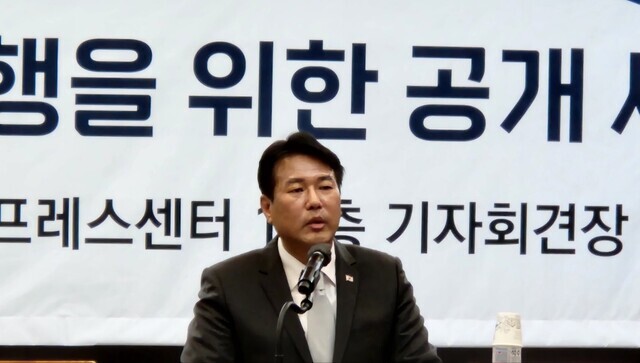hankyoreh
Links to other country sites 다른 나라 사이트 링크
First look at newly released details of Yoon’s “audacious initiative” for denuclearizing N. Korea

The Yoon Suk-yeol administration outlined the details of its North Korea policy, known as the “audacious initiative”, for the first time in an official document released Monday.
According to the content of the document, a “package deal” must be reached at the beginning of denuclearization talks with North Korea, and corresponding measures would then be taken simultaneously and step by step in the fields of economy, politics and military in line with progress made on the denuclearization front.
On Monday, the Ministry of Unification unveiled a document titled “A Nuclear-free, Peaceful, and Prosperous Korean Peninsula: The Yoon Suk-yeol Government’s Unification and North Korea Policy” (Unofficial translation, 35 pages).
According to this booklet, the administration’s “audacious initiative” consists of three stages: 1) initial measures and a comprehensive agreement, 2) substantive denuclearization, and 3) complete denuclearization. In short, this approach seeks a step-by-step and simultaneous implementation approach after a package deal is agreed on.
In the first step, the Ministry of Unification said it will pursue a "comprehensive agreement" that includes a roadmap agreement that has details such as the definition and goals of denuclearization, step-by-step denuclearization measures, and corresponding measures according to different sectors.
In other words, not only must both sides agree on the final goal of “complete denuclearization”, but all the other parts leading up to that also have to be agreed upon at a very early stage.
"The details regarding complete denuclearization must be completed at the beginning to move on to the remaining stages,” a Unification Ministry official said.
According to the Yoon government, if a roadmap to denuclearization can be agreed upon by the two Koreas, then they will “implement comprehensive measures simultaneously and step-by-step in the economic, political, and military sectors in line with North Korea's progress on denuclearization."
Regarding the step of “substantial denuclearization,” the government said it will push for three political and military measures in accordance with this stage: 1) support for normalization of US-North Korea relations, 2) holding discussions on establishing a peace regime, and 3) building inter-Korean military trust and promoting arms control.
However, this approach is quite different from the "step-by-step and simultaneous approach" that North Korea and China have emphasized up to this point, which calls for building trust and gradually agreeing on denuclearization and corresponding measures and implementing them in parallel according to the principle of simultaneous action.
Furthermore, North Korea has already rejected Yoon’s “audacious initiative” in a statement from Kim Yo-jong on Aug. 19 in which the North Korean leader’s powerful sister called the plan a “copy” of the Lee Myung-bak government’s defunct “Vision 3000: Denuclearization and Openness” plan.
Nevertheless, Seoul announced that it would pursue initial measures such as exchange programs with North Korea on natural resources and food as well as a pilot project to improve the livelihoods of North Korean people in order to “secure and maintain momentum for negotiations” on the premise of “North Korea’s return to denuclearization negotiations”.
In this regard, it differs from the traditional “denuclearization first” approach.
“If North Korea joins denuclearization talks, we will be able to put the issues of concern to North Korea on the table and discuss them in a reciprocal way,” Minister of Unification Kwon Young-se said in his opening address at the seminar about the implementation of Yoon’s initiative on Monday.
In his keynote speech at the seminar, National Security Office First Deputy Director Kim Tae-hyo said, “As a way to bring North Korea back to dialogue, the three ‘D’ policies of deterrence, dissuasion, and dialogue are included as action principles.”
“We must continue to push for deterrence and persuade [North Korea to give up its nuclear weapons] until the final talks are concluded,” he added.
By Lee Je-hun, senior staff writer
Please direct questions or comments to [english@hani.co.kr]

Editorial・opinion
![[Column] Tariffs on China: Trump was dumb, Biden dumber [Column] Tariffs on China: Trump was dumb, Biden dumber](https://flexible.img.hani.co.kr/flexible/normal/500/300/imgdb/original/2024/0520/191716191153918.jpg) [Column] Tariffs on China: Trump was dumb, Biden dumber
[Column] Tariffs on China: Trump was dumb, Biden dumber![[Column] What if Seoul took reunification by force off the table? [Column] What if Seoul took reunification by force off the table?](https://flexible.img.hani.co.kr/flexible/normal/500/300/imgdb/original/2024/0520/3017161928630494.jpg) [Column] What if Seoul took reunification by force off the table?
[Column] What if Seoul took reunification by force off the table?- [Editorial] Intensifying US-China rivalry means Seoul must address uncertainty with Beijing sooner than later
- [Column] When ‘fairness’ means hate and violence
- [Editorial] Yoon must stop abusing authority to shield himself from investigation
- [Column] US troop withdrawal from Korea could be the Acheson Line all over
- [Column] How to win back readers who’ve turned to YouTube for news
- [Column] Welcome to the president’s pity party
- [Editorial] Korea must respond firmly to Japan’s attempt to usurp Line
- [Editorial] Transfers of prosecutors investigating Korea’s first lady send chilling message
Most viewed articles
- 1Xi, Putin ‘oppose acts of military intimidation’ against N. Korea by US in joint statement
- 2For new generation of Chinese artists, discontent is disobedience
- 3[Editorial] Transfers of prosecutors investigating Korea’s first lady send chilling message
- 4[Column] When ‘fairness’ means hate and violence
- 5[Editorial] Intensifying US-China rivalry means Seoul must address uncertainty with Beijing sooner t
- 6How K-pop broke the internet — and broke into the US market
- 7[Exclusive] Unearthed memo suggests Gwangju Uprising missing may have been cremated
- 8‘Shot, stabbed, piled on a truck’: Mystery of missing dead at Gwangju Prison
- 9Naver to acquire Canada’s Wattpad to fuel its IP ambitions
- 10AI, robots won’t free us from work - they’ll make our jobs worse